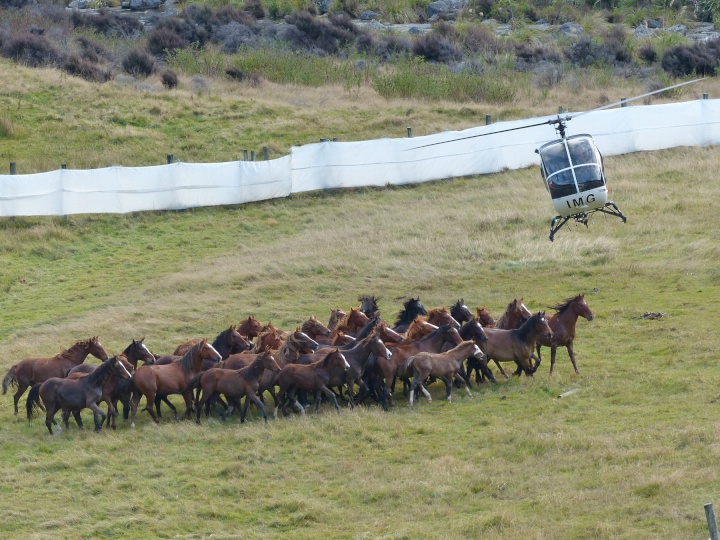170 wild horses re-homed
170 wild horses re-homed
One-hundred-and-seventy Kaimanawa wild horses have been successfully re-homed following the weekend’s muster from the Waiouru Military Training Area (WMTA).

The largest group of the
muster - 35 horses brought into the yards by expert
helicopter muster pilots. (Photo credit to Department of
Conservation)
A total of 175 were mustered, however, five horses were deemed unsuitable for adoption by the veterinarian and had to be euthanised on site.
Two dedicated not-for-profit groups had the mammoth task of finding homes for the horses; Kaimanawa Wild Horse Preservation Society (KWHPS) placed 13 horses and Kaimanawa Heritage Horses (KHH) re-homed 157.
A month out from the muster only around 60 horses had homes, but remarkably the application total came in at over 270 with KHH receiving a massive influx of applications in March after the annual population survey result of 621, showing there were 321 horses too many within the range.
The re-homing total
applications is a record number in the history of wild horse
re-homing.
However logistically the group can only
re-home a maximum 160 horses from one muster so the
Department of Conservation (DOC) and KHH are planning a
second operation for the last week of May 2018 to muster and
re-home a further 150 horses.
DOC Central Plateau Operations Manager Dave Lumley described it as a great outcome.
“This is the result of a big effort by both
horse advocacy groups – KHH and KWHPS – and demonstrates
the value of our Kaimanawa Wild Horse Advisory Group in
working together towards positive solutions.”
“We’d
also like to thank the public for supporting the work of
both re-homing groups,” Mr Lumley said.
The muster is held every two years by the Department of Conservation to manage the herd at the sustainable level of 300 horses within the WMTA as recommended by the Kaimanawa Wild Horse Advisory Group. This allows horses in the herd to maintain best condition and protects the fragile ecosystems unique to the Moawhango Ecological zone.
The advisory group, which provides advice to DOC on implementing the management plan, comprises representatives from DOC, New Zealand Defence Force, KHH, KWHPS, Ngati Rangi, RNZSPCA, Forest & Bird, NZ Veterinary Association and adjoining landowners.


 Gordon Campbell: On America’s Fear Of Foreigners
Gordon Campbell: On America’s Fear Of Foreigners Office of the Speaker: Members To Address Global Issues & Examine Parliamentary Democracy At 67th Commonwealth Parliamentary Conference In NSW
Office of the Speaker: Members To Address Global Issues & Examine Parliamentary Democracy At 67th Commonwealth Parliamentary Conference In NSW Pahiatua Polish Children: Polish And Pahiatua Communities Celebrate 80 Years Since Arrival Of Pahiatua Polish Children
Pahiatua Polish Children: Polish And Pahiatua Communities Celebrate 80 Years Since Arrival Of Pahiatua Polish Children NZ Customs Service: Customs Returns 60 Kilograms Of Pounamu To Rightful Guardians
NZ Customs Service: Customs Returns 60 Kilograms Of Pounamu To Rightful Guardians Tūpuna Maunga Authority: Devasting Fire On Maungarei / Mt Wellington Underscores Importance Of Maunga Protections
Tūpuna Maunga Authority: Devasting Fire On Maungarei / Mt Wellington Underscores Importance Of Maunga Protections NZ Government: Breast Screening Age Extension Begins In Nelson Marlborough
NZ Government: Breast Screening Age Extension Begins In Nelson Marlborough NZ Police: Police Reassure Public With High Visibility Across Network
NZ Police: Police Reassure Public With High Visibility Across Network


